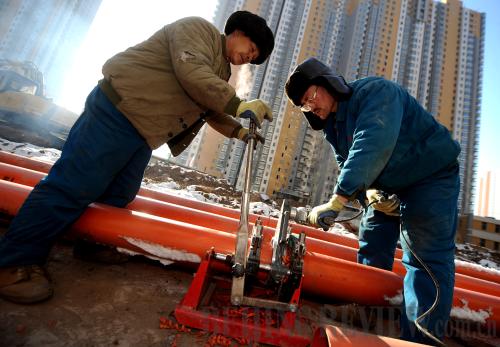|
 |
|
HOME SWEET HOME: Workers connect pipelines at a construction site of an affordable housing project in Taiyuan, Shanxi Province (YAN YAN) |
Emphasizing responsibilities of local governments will be an important part of real estate regulation in 2012.
Ren Xingzhou, Director of the Institute of Market Economy of the Development Research Center of the State Council, said real estate regulation will reduce local governments' revenues from transferring land use right to real estate developers, which will slow down the speed of local economic development and fiscal revenue growth.
However, in the mid- and long-term, the regulation is conducive to helping liberate local economies from excessive dependency on the real estate industry and advance readjustments to the industrial structure and revenue structure of local governments.
The MOHURD has also required local governments to accelerate construction of an individual housing information system.
"This is a very important task in 2012 and of great significance to strengthen and improve real estate regulation and social administration," said Jiang. The individual housing information systems of 40 key cities should be connected to the system of the MOHURD by the end of the first half of 2012, according to Jiang.
Jiang said both the MOHURD and local governments should formulate housing development plans in 2012 to promote long-term development of the real estate market. In the meantime, the MOHURD will accelerate research on collecting individual real estate taxes by cooperating with other related departments.
Continuing real estate regulations mean real estate developers will be deprived of capital in 2012 and may have to bid farewell to the favorable market from previous years.
According to Operation and Management of China's Real Estate Enterprises (2011), a blue book jointly released by China Real Estate Association (CREA) and Rand Consulting Co. Ltd., in the previous two years the number of real estate companies reduced by one fourth, and the tendency is accelerating under the background of real estate regulation. If the regulation policies are fully implemented, it is expected that 30 percent of the existing real estate companies will disappear by 2015.
"In previous years, some real estate developers were expanding too fast, with debt scale increasing. Moreover, as some non-estate companies entered the real estate market, there are companies of various qualities in the real estate industry. Therefore, persisting in real estate regulation is conducive to accelerating integration of the real estate industry," said Ren.
According to him, as the industry faces a slow drawback of investment and severe pressure of repaying debts, some unqualified enterprises who do not emphasize product quality will be acquired or purchased by more powerful and competent enterprises.
Jiang said in 2012 the MOHURD will strengthen administration of home prices and punishment of illegal land use. The government will also improve public awareness of market risks and guide home buyers and real estate developers to settle disputes caused by price fluctuations through contracts or judicial ways.
"There will be four changes in the real estate market," said Zhu Zhongyi, Vice Chairman of the CREA.
First, a seller's market will be transferred to a buyer's market; second, major products in the housing market will be commercial homes and affordable homes instead of commercial homes only; third, both home sales and rent will be active in the housing market instead of selling new houses only; fourth, in the whole real estate market product varieties will be diversified to homes, business property, tourism property and industrial park property instead of homes only.
According to Zhu, real estate companies need to readjust their expectations of investment returns and transform their business development, focusing on improving cost performance of their products, not just scale and speedy development.
Email us at: wangjun@bjreview.com | 